Top Foods and Home Remedies to Reduce your Cholesterol Level Naturally
Last updated on : 04 Apr, 2025
Read time : 33 min
What is Cholesterol?
The liver plays a crucial role in producing a waxy substance called cholesterol, which is vital for adequately functioning cell membranes, hormones, and vitamin D.
Conversely, lipoproteins are made up of protein and fat and carry cholesterol and triglycerides in the bloodstream. There are two main lipoproteins: low-density lipoprotein (LDL) and high-density lipoprotein (HDL).
Low-density lipoproteins carry LDL cholesterol; if the bloodstream contains excess LDL cholesterol, it can result in high cholesterol levels. Failure to address high cholesterol can increase the possibility of developing health issues such as heart attacks and strokes.
This blog highlights some of the effective home remedies for cholesterol control. Continue reading to explore more.
How to Reduce Cholesterol Naturally
Numerous studies show that lowering LDL cholesterol levels can significantly reduce the risk of heart-related problems like heart attacks and strokes. This applies to people with heart disease and those at a high risk of developing it, even if they don’t have it yet. It also means fewer invasive procedures like catheterisations or bypass surgeries.
Read more: Cardiovascular disease – Signs and symptoms
Home Remedies for High Cholesterol
Let’s look at some of the home remedies to reduce cholesterol.
- Increase your fibre intake
- Familiar sources of soluble fibre
- Adopt a plant-based diet
- Exercise
- Increase omega-3 intake
- Weight management
- Regulate alcohol intake
- Stop smoking
- Decrease stress
- Take supplements
- Drink green tea
Let’s look at some of the home remedies to reduce cholesterol.
1) Increase your fibre intake
Integrating dietary fibre into daily meals is essential to maintaining a wholesome and nutritious diet and is one of the cholesterol control home remedies.
Studies indicated that individuals who consume more than ten grams of soluble fibre can experience a decrease in their LDL (low-density lipoprotein) cholesterol levels, commonly known as “bad cholesterol.” Hence, in turn, it lowers the risk of heart disease.
Familiar sources of soluble fibre
- Fruits (apples, pears, oranges)
- Peas
- Psyllium Husk (Isabgol)
- Oats
- Beans
- Lentils
2) Adopt a plant-based diet
Eating a plant-based diet can help to reduce cholesterol naturally. This diet focuses on consuming many fruits, vegetables, nuts, and whole grains. It positively impacts LDL cholesterol, also known as “bad cholesterol.”
Plant-based foods
- Legumes
- Leafy vegetables
- Seeds
- Quinoa
- Hummus
- Vegetable oils
- Nut butter
3) Exercise
Moderate-to-high-intensity exercise can help to lower the levels of LDL cholesterol, or “bad cholesterol.” However, it also can increase HDL cholesterol levels, often called “good cholesterol”, as it helps remove other forms of cholesterol from your body.
Read more: Exercises to reduce belly fat
Some common forms of aerobic exercise
- Swimming
- Playing tennis
- Biking
- Jogging
- Jumping rope
- Walking
4) Increase omega-3 intake
Triglycerides, fat in the blood, can pose a risk of heart disease. Omega-3 fatty acids stand out among all the nutrients to have the most impact on the levels of triglycerides in the bloodstream.
Omega-3 rich foods
- Fatty fish
- Nuts
- Seeds
- Plant oils
- Salmon
- Tuna
- Mackerel
- Anchovies
- Black cod
- Herring
5) Weight management
Obesity can increase your chances of developing high cholesterol, but there’s good news – you can reverse this risk. Even small, gradual reductions in your weight can significantly impact your cholesterol levels.
6) Regulate alcohol intake
The impact of alcohol on cholesterol levels depends on the amount and frequency of consumption. A moderate intake of alcohol can increase HDL and offer some safety against heart disease. However, excessive drinking can lead to an increase in triglycerides, which is detrimental to heart health.
Read more: Tips to Overcome Alcohol Addiction
7) Stop smoking
Smoking has been found to harm an individual’s health, including increased cholesterol levels. It reduces HDL cholesterol levels, which are suitable for the body, while simultaneously increasing LDL cholesterol, which is terrible for the body. Giving up smoking can be challenging but essential for your health.
Read more: Effects of Cigarette Smoking on Health
Some options that help in quitting smoking:
- Nicotine replacement
- Medication
- Counselling
- Quitlines
- Online support groups
8) Decrease stress
Studies have shown that heightened stress levels may lead to higher levels of LDL and triglycerides. These findings indicate that stress management techniques should be considered for maintaining healthy cholesterol levels.
Some easy and helpful ways to decrease stress are
- Eating a balanced diet
- Using relaxation techniques
- Getting enough sleep
- Staying active
- Practising mindfulness
9) Take supplements
Incorporating certain dietary supplements into your routine is beneficial in your efforts to improve your cholesterol levels. These supplements amplify the effects of a healthy diet and regular exercise, ultimately contributing to a healthier and happier lifestyle.
Common supplements that may help lower your cholesterol include
10) Drink green tea
Numerous studies have proven that green tea in your daily diet can significantly reduce LDL and total cholesterol levels. It is because of the presence of flavonoids in green tea, which have been shown to inhibit the body’s production of cholesterol and improve absorption rates.
Foods That Lower Cholesterol
Let’s explore some natural ways to reduce cholesterol.
1. Amla Juice
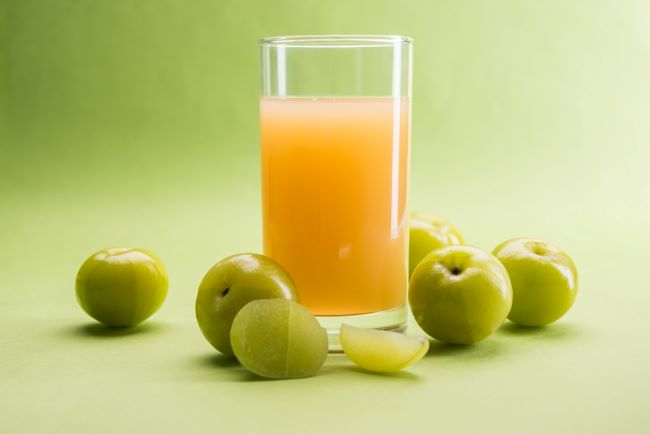
Consuming amla fruits can lower your harmful cholesterol levels. This natural remedy is highly beneficial for individuals with high cholesterol and contains abundant vitamin C. Additionally, amla fruits can aid in the repair and growth of your body’s cells.
2. Garlic
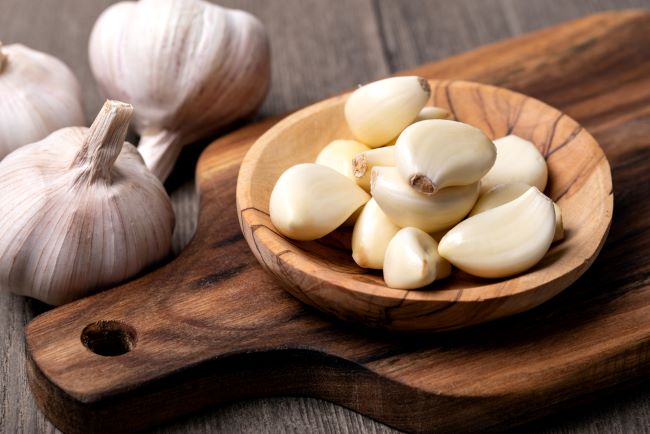
Research has found that eating raw garlic can positively affect heart health. However, be aware of the side effects of eating raw garlic every day. Studies have shown garlic can help lower LDL cholesterol (often called “bad” cholesterol) and triglycerides. Eating about half to one clove of garlic daily has been associated with a reduction in cholesterol levels by around 10%.
3. Drink Water With Coriander Seeds
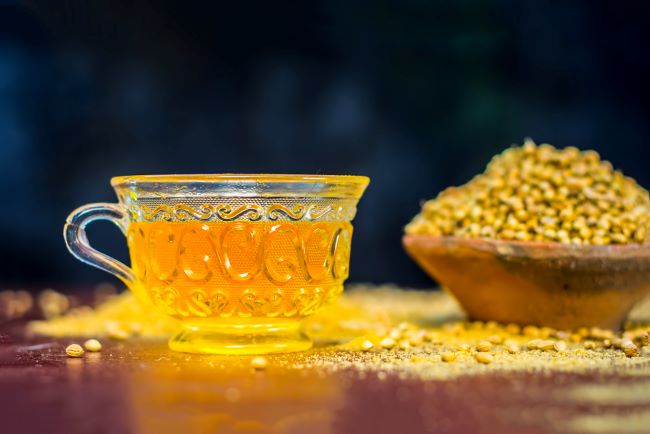
Consuming water with coriander seeds could benefit your heart health by decreasing blood pressure and lowering LDL (bad) cholesterol while boosting HDL (good) cholesterol. Studies suggest that a diet rich in spices may be connected to a reduced risk of heart disease.
4. Fatty Fish

Omega-3 fatty acids are plentiful in fatty fish and can work wonders for your health. They can efficiently lower the fat levels in your bloodstream, decrease blood pressure and significantly reduce the probability of blood clot formation. Furthermore, studies reveal that omega-3 fatty acids can reduce the risk of sudden death for individuals with heart attacks. Incorporating fatty fish into your diet can be an excellent way to ensure optimal health.
5. Eat Flaxseeds
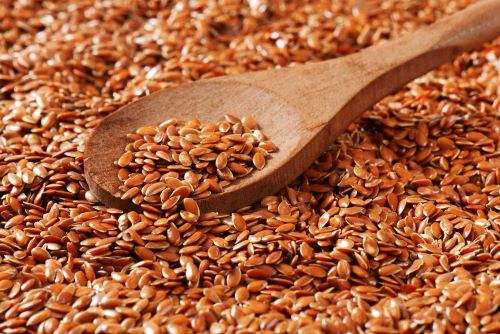
Including flaxseeds in your daily diet can positively impact your cardiovascular health. Research has shown that the consumption of flaxseeds can aid in the prevention of cholesterol build-up in your arteries and reduce inflammation. This natural remedy can be a great addition to your cholesterol-lowering regimen.
6. Nuts

Incorporating tree nuts, including almonds, into your diet can positively impact your cholesterol levels. According to a recent study, consuming walnuts as part of your daily diet may also decrease the likelihood of heart-related issues for individuals with a history of heart attacks. It is vital to remember that nuts are high in calories and consumed in limited amounts, such as adding a small handful to a salad or enjoying it as a snack.
7. Legumes
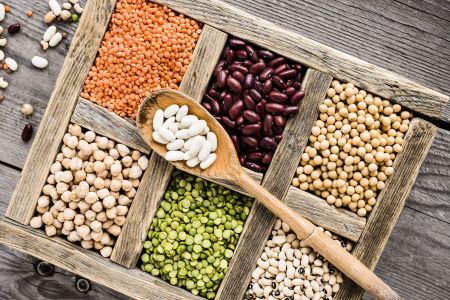
Legumes are known to impact blood cholesterol levels positively. The fibres found in legumes are soluble and insoluble, and they play a crucial role in reducing cholesterol absorption in the gut. Additionally, these fibres promote the growth of healthy gut bacteria in the large bowel, which is essential for overall health.
8. Dark Chocolate
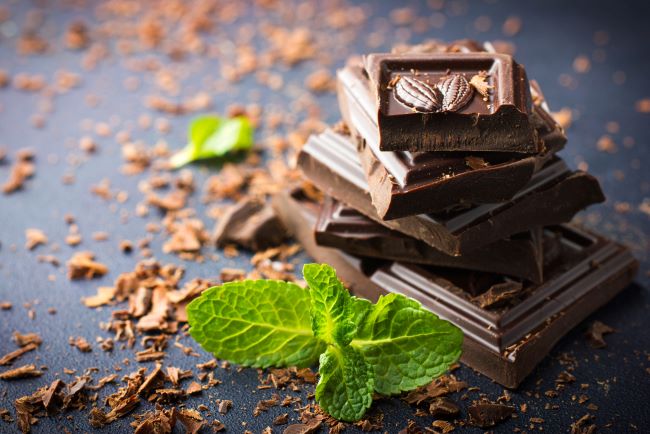
Ongoing studies suggest that dark chocolate may offer numerous health advantages, such as reducing the possibility of heart disease and diabetes, blood clots, enhancing memory, lowering cholesterol, and even helping prevent certain types of cancer.
9. Brussels Sprouts
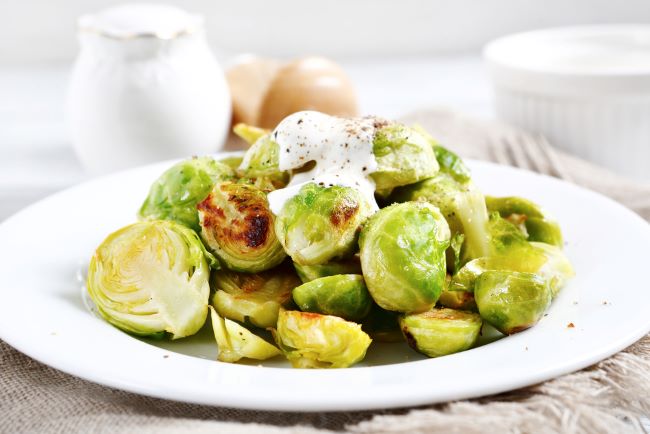
The soluble fibre in Brussels sprouts works wonders for cardiovascular health by inhibiting cholesterol absorption. It reduces LDL (“bad”) cholesterol levels in your bloodstream, safeguarding your heart against potential damage.
10. Safflower Oil
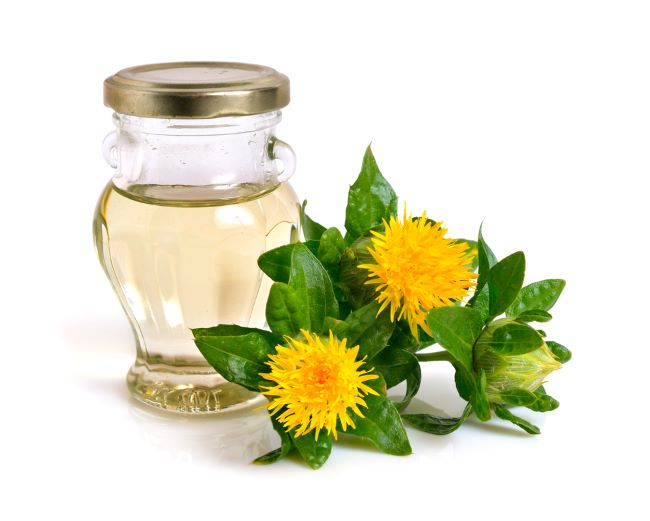
Safflower oil boasts an impressive 75% linoleic acid concentration, which has been shown to have potential cholesterol-lowering effects and promote better heart and circulatory health. Compared to other oils like Corn, safflower oil’s linoleic acid content is significantly superior.
11. Kale

Kale, a nutritious vegetable with vitamins and the powerful antioxidant lutein is a natural remedy to combat high cholesterol. Lutein is known to inhibit cholesterol build-up in the body and can assist in reducing the risk of heart attacks and strokes.
12. Avocado
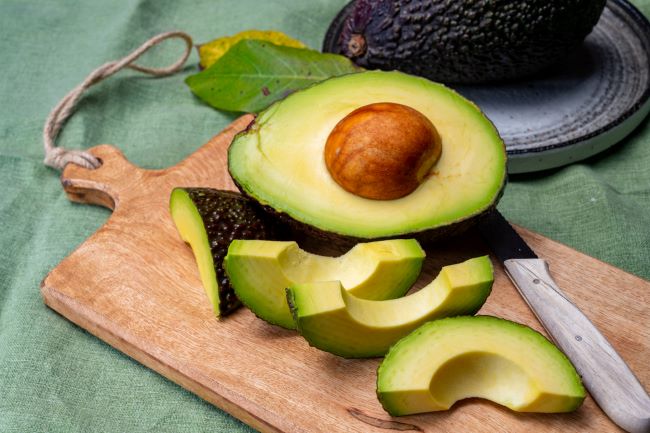
Monounsaturated fat is present in avocados, a type of fat that promotes good health. On the other hand, saturated fats can increase cholesterol levels and enhance the likelihood of a person developing cardiovascular disease.
13. Red Wine

Recent studies have found that moderate alcohol consumption can positively affect cholesterol levels. In particular, red wine has been shown to contain polyphenol antioxidants that can help lower LDL levels.
For those who do not prefer alcohol, grape juice may offer similar heart-healthy benefits. It is essential to remember, however, that excessive alcohol consumption can negatively affect overall health and should be avoided.
Recommended Products to Reduce Cholesterol
You can try the following products to reduce your cholesterol levels. Before using them, consult your doctor.
1. Yuvika Isabgol Bhusi Psyllium Husk
Yuvika Isabgol Bhusi is a natural fiber supplement made from psyllium husk. It is commonly used to support digestive health by relieving constipation and promoting regular bowel movements. It also aids in maintaining overall gut health.
How to Use:
- Mix 1-2 teaspoons of Isabgol in a glass of water or juice.
- Consume it immediately.
- Drink plenty of water throughout the day.
2. Supermucil Psyllium Husk
Supermucil Psyllium Husk is a dietary supplement that promotes digestive health. It helps in relieving constipation and supports regular bowel movements, making it an excellent choice for improving overall gut health.
How to Use:
- Take 1-2 teaspoons with a glass of water or juice.
- Consume once or twice daily, as needed.
- Ensure adequate water intake throughout the day.
3. Baidyanath Vansaar Isabgol Psyllium Husk Powder
Baidyanath Vansaar Isabgol is a natural, high-fiber supplement designed to relieve constipation and promote digestive health. It helps regulate bowel movements and improves gut function, making it an effective remedy for digestive issues.
How to Use:
- Take 1-2 teaspoons with water or juice.
- Consume once or twice daily.
- Drink plenty of fluids to aid the process.
4. Dabur Sat Isabgol Psyllium Husk
Dabur Sat Isabgol is a pure psyllium husk product known for its ability to relieve constipation and promote digestive health. It provides a natural source of dietary fiber, ensuring smoother digestion and regular bowel movements.
How to Use:
- Mix 1-2 teaspoons of Isabgol with water or juice.
- Take it once or twice a day for best results.
- Drink enough water throughout the day.
5. Hamdard Sat Isabgol Psyllium Husk Powder
Hamdard Sat Isabgol is a natural fiber supplement that aids in relieving constipation and maintaining digestive health. It is gentle on the stomach and supports smooth bowel movements.
How to Use:
- Add 1-2 teaspoons of Isabgol to a glass of water.
- Stir well and consume.
- Ensure sufficient fluid intake throughout the day.
6. Baidyanath Isabgol Psyllium Husk
Baidyanath Isabgol Psyllium Husk is a natural, high-fiber product that helps relieve constipation and promotes healthy digestion. It regulates bowel movements and supports overall gut health.
How to Use:
- Take 1-2 teaspoons of Isabgol with water or juice.
- Consume once or twice daily, as directed.
- Drink plenty of water to aid digestion.
7. Ashapoorna Sat Isabgol Psyllium Husk Powder
Ashapoorna Sat Isabgol is a high-quality psyllium husk powder that aids in digestion and promotes regular bowel movements. It is an excellent source of dietary fiber that supports overall gut health.
How to Use:
- Mix 1-2 teaspoons with water or juice.
- Consume once or twice a day.
- Drink plenty of fluids for optimal results.
8. Deer Brand Sat Isabgol Psyllium Husk Powder
Deer Brand Sat Isabgol is a natural psyllium husk powder that helps maintain bowel regularity and supports digestive health. It acts as a gentle laxative, promoting smoother digestion.
How to Use:
- Add 1-2 teaspoons to a glass of water or juice.
- Stir well and drink immediately.
- Drink plenty of water throughout the day.
9. Bliss Of Earth Certified Organic Raw Chia Seeds
Bliss Of Earth Organic Chia Seeds are packed with essential nutrients, including omega-3 fatty acids, fiber, and protein. These chia seeds support digestive health, boost metabolism, and improve overall well-being.
How to Use:
- Add chia seeds to smoothies, yogurt, or baked goods.
- Let them soak in water for a few minutes to form a gel-like texture.
- Consume daily for maximum benefits.
10. Mewar Impex Chia Seed
Mewar Impex Chia Seeds are rich in fiber, protein, and antioxidants. These seeds support heart health, improve digestion, and promote overall wellness when included in your daily diet.
How to Use:
- Add to smoothies, oatmeal, or salads.
- Soak in water for a few minutes before consumption.
- Include in your diet for daily nourishment.
11. Khari Foods Chia Seeds
Khari Foods Chia Seeds are high in nutrients like omega-3 fatty acids and fiber. They help improve digestion, enhance skin health, and boost energy levels, making them a great addition to your diet.
How to Use:
- Sprinkle on salads, smoothies, or cereals.
- Let them soak in water for a gelatinous texture.
- Consume regularly for best results.
12. Neuherbs Organic Chia Seeds
Neuherbs Organic Chia Seeds are an excellent source of protein, fiber, and omega-3 fatty acids. These seeds help support digestion, improve hydration, and enhance overall health.
How to Use:
- Add to smoothies, salads, or yogurt.
- Soak in water for a few minutes to create a gel-like consistency.
- Incorporate into your daily routine for optimal benefits.
What is the Quickest Way to Lower Cholesterol Without Medication?
- Weight management and stress reduction may take longer to show results but offer immediate benefits.
- Including resistance training in your routine can lower cholesterol within six weeks.
- Omega-3 fatty acids can improve triglyceride levels in at least four weeks.
- Combining dietary changes and exercise is more effective in lowering cholesterol than doing them individually.
Conclusion
To achieve optimal results, incorporating a daily regimen of 10 to 20 minutes of cardio exercises and implementing natural remedies at home can be beneficial in managing high cholesterol. However, if you experience fluctuating cholesterol levels, you should talk with a physician before attempting new remedies or exercise routines.
You can download our user-friendly Truemeds app for easy access. Submit your prescription to our platform to receive branded and generic medications. Enjoy savings on purchases and the added convenience of free home delivery on relevant orders across India*.
Frequently Asked Questions
Integrating dietary changes, such as consuming foods rich in omega-3 fatty acids and soluble fibre, can quickly lower cholesterol levels. Regular exercise and weight management are also effective in reducing cholesterol.
Green tea has been associated with modest reductions in cholesterol levels. Consuming it regularly as part of a healthy diet may contribute to lowering cholesterol.
While bananas are nutritious, they don’t directly impact lowering cholesterol levels. However, they are a great source of dietary fibre, which can benefit overall heart health.
Cholesterol is removed from the body through a process called reverse cholesterol transport. It involves the liver producing bile acids that help break down cholesterol and eliminate it through the digestive system.
Water is essential for overall health but doesn’t directly reduce cholesterol levels. However, staying hydrated is vital for optimal bodily functions and can indirectly support cardiovascular health.
A handful of almonds (about 1 ounce or 23) improves cholesterol levels due to their heart-healthy fats and other beneficial nutrients.
While lemon water is a refreshing and hydrating beverage, it doesn’t significantly impact lowering cholesterol levels. However, incorporating lemon into a healthy diet can provide vitamin C and antioxidants beneficial for heart health.
Consuming raw or cooked garlic regularly as part of a healthy diet can positively impact cholesterol levels. It is suggested to chop garlic and let it sit for a few minutes to enhance the formation of beneficial compounds before incorporating it into your meals.
Genetic factors, poor diet, lack of physical activity, obesity, smoking, certain medical conditions, and age can influence high cholesterol levels. It’s vital to consult a healthcare professional to determine the reasons for elevated cholesterol levels.
A desirable cholesterol level is below 200 milligrams per deciliter (mg/dL). However, it’s essential to consider the breakdown of cholesterol into LDL (bad cholesterol), HDL (good cholesterol), and triglycerides, as these components impact cardiovascular health differently.
While it may not be viable for everyone to eliminate high cholesterol, a healthy lifestyle can significantly reduce cholesterol levels and minimise the risk of cardiovascular diseases.
Green tea has been associated with modest reductions in cholesterol levels, mainly due to the presence of antioxidants called catechins. Regular consumption of green tea and a healthy diet and lifestyle may contribute to maintaining healthy cholesterol levels.
Lowering cholesterol in three days is challenging. Still, you can start by adopting a healthy diet rich in fruits, vegetables, grains, and proteins while avoiding saturated and trans fats.
Including oats, nuts, fatty fish, olive oil, legumes, and fruits rich in soluble fibre can help lower cholesterol levels over time when consumed as part of a balanced diet.
The home remedies to control cholesterol are to prioritise a diet rich in fruits, vegetables, grains, proteins, and healthy fats. Regular exercise, weight management, avoiding smoking, and limiting alcohol intake contributes to cholesterol control.
Controlling cholesterol can be done by following home remedies for cholesterol like eating a healthy diet low in saturated fats and cholesterol, exercising regularly, maintaining a healthy weight, and avoiding smoking. Adding foods rich in fibre, like fruits, vegetables, and whole grains, can also help lower cholesterol levels naturally.
To reduce cholesterol naturally, try incorporating home remedies to control cholesterol like eating oatmeal, nuts, and foods rich in omega-3 fatty acids such as fish into your diet. Drinking green tea, adding garlic to your meals, and consuming olive oil may also help lower cholesterol levels.
One of the best home remedies for cholesterol is eating oatmeal regularly. Oatmeal contains soluble fiber, which can help lower LDL (bad) cholesterol levels. Additionally, consuming foods rich in omega-3 fatty acids, such as fish, and incorporating garlic and olive oil into your diet may also be beneficial for managing cholesterol levels.
You can try home remedies to reduce cholesterol naturally by making dietary changes, exercising regularly, and maintaining a healthy lifestyle. Focus on eating a diet rich in fruits, vegetables, whole grains, and lean proteins. Avoid processed foods, saturated fats, and excessive sugar intake. Incorporating home remedies like oatmeal, nuts, green tea, garlic, and olive oil into your diet can also help lower cholesterol levels.
While there’s no quick fix to lower cholesterol levels, making lifestyle changes such as adopting a healthy diet, exercising regularly, and managing stress can gradually reduce cholesterol levels over time. Additionally, incorporating cholesterol-lowering home remedies like oatmeal, nuts, green tea, garlic, and olive oil into your daily routine can contribute to faster improvement.
Drinking green tea regularly is one option to help reduce cholesterol levels naturally. It is one of the home remedies to control cholesterol. Green tea contains antioxidants called catechins, which may help lower LDL (bad) cholesterol levels. Other beverages that may be beneficial for cholesterol management include fresh fruit juices, particularly those high in antioxidants like orange juice, and herbal teas like hibiscus tea, which has been linked to lower cholesterol levels.
Disclaimer
The content provided within this article has been thoroughly verified for accuracy. However, we advise consulting a healthcare professional before utilising any medication or dietary supplements mentioned herein.
References
- https://www.cdc.gov/cholesterol/prevention.htm
- https://medlineplus.gov/ency/article/002136.htm
- https://www.nccih.nih.gov/health/green-tea
- https://www.ncbi.nlm.nih.gov/pmc/articles/PMC3563284/
- https://www.nccih.nih.gov/health/cholesterol-management-at-a-glance
- https://www.heart.org/en/healthy-living/healthy-eating/eat-smart/fats/saturated-fats
Disclaimer
Our healthcare experts have carefully reviewed and compiled the information presented here to ensure accuracy and trustworthiness. It is important to note that this information serves as a general overview of the topic and is for informational purposes only. It is not intended to diagnose, prevent, or cure any health problem. This page does not establish a doctor-patient relationship, nor does it replace the advice or consultation of a registered medical practitioner. We recommend seeking guidance from your registered medical practitioner for any questions or concerns regarding your medical condition.
Popular Articles
Recommended Articles
Recent Articles
Top-Selling Medicines:
...View more
Top-Selling OTC:
...View more
Subscribe
Registered Office Address
Grievance Officer
Download Truemeds

Contact Us
Our customer representative team is available 7 days a week from 9 am - 9 pm.
v3.7.5
Our Payment Partners


























































